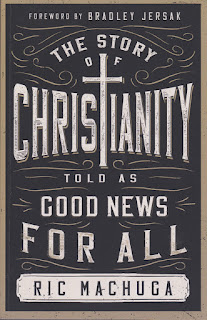The claim is provocative, of course, because at first glance it seems to override human free will. What about those who choose not to believe? In the book's sixteen chapters Machuga tackles the question head on, first through a philosophical lens and then through a theological lens. Even those who vehemently disagree will find I-never-thought-about-it-that-way insights in "The Story Of Christianity Told As Good News For All" ($15.99 in paperback from Quoir, quoir.com; also for Amazon Kindle).
If moderns sometimes talk about “choosing to believe,” Machuga questions the coherence of that claim. He tells his own story of how "God’s choreography" brought him to belief in universal salvation, belief that for him is as undeniable as the roses outside his office window. "Belief is voluntary," he writes, "but it is not chosen."
Central to Machuga's argument is that in Christianity, God is "non aliud," meaning "not 'another thing or person' in the universe." His key theological claim tracks with Augustine, that God created “a world with space and time, not in space and time.” God is not just another a thing in the universe competing with human free will.
The book uses some important, and mostly jargon-free, philosophical distinctions to draw out the implications of this view, which allow for affirmation of the traditional Christian Creeds within the context of “salvation for all.” And, importantly, it places new emphasis on the doctrine of the Trinity and the revelation of this transcendent God through the God-man, Jesus of Nazareth.
Machuga’s own story of this gift of belief is woven into his account, and it’s clear his prayer is that this volume may also be part of the Holy Spirit’s choreography for the person who takes up this book, and reads.
